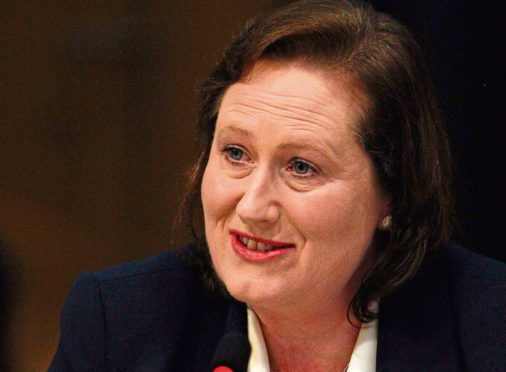
The former chair of the Scottish Police Authority has branded governance of the national force as fundamentally flawed and demanded root and branch reform.
Susan Deacon spoke out after publication of what she said was a “game-changing” report into police complaints, investigations and misconduct issues by former Lord Advocate Dame Elish Angiolini. It proposed reforms including new powers for the independent handling of complaints, and called for a drive to rid the force of a macho culture.
Professor Deacon resigned from the SPA last year. In an eight-page letter to Justice Secretary Humza Yousaf, published yesterday, she said: “I remain of the view that there are fundamental flaws in many aspects of the current arrangements for governance and accountability.”
Professor Deacon said the priniciple of an arms-length relationship between the police and the government needed to be “explored and developed further”.
She said: “The realities of the day-to-day relationships between both the authority and government, and the police service and government merit examination. In my experience, the close and multiple channels of communication which have become the norm are, at best, inefficient and confusing and, at worst, compromise the separation that was intended.”
She also said that Police Scotland and its watchdog were “joined at the hip”.
The Angiolini report found evidence of misogyny within Police Scotland. The report made 81 recommendations.
Dame Angiolini said: “I was deeply concerned to hear about the experiences of staff from Black, Asian and minority ethnic communities, as I was to hear about discrimination experienced by female and LGBTI officers.”
Last month The Sunday Post revealed how a former member of the Police Scotland firearms unit had drawn up a dossier detailing concerns over bullying, morale and the suppression of complaints – but his concerns were dismissed by the force.
Retired firearms officer Rhona Malone, 44, who says her life was made unbearable after she spoke out about sexism, said: “A boys’ club culture has existed and prevailed between the organisations concerned where it seems nothing and nobody outside the gang can hold them to account.”
Moi Ali, who quit the SPA in 2017 after objecting to plans to hold meetings in secret, said: “There is real merit in decoupling the SPA board appointment process from government, and giving Parliament a greater say.
“It is not right that appointments to the main policing oversight body are made by the Justice Secretary using a process that completely lacks transparency.”
The Scottish Government said: “We take these issues very seriously and earlier this year established a Policing Governance Roundtable. The unanimous view of this group is that a major existential review of the system of policing and governance is not required at this time.”

Enjoy the convenience of having The Sunday Post delivered as a digital ePaper straight to your smartphone, tablet or computer.
Subscribe for only £5.49 a month and enjoy all the benefits of the printed paper as a digital replica.
Subscribe